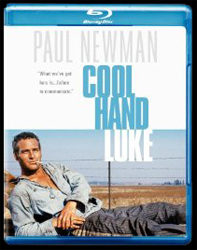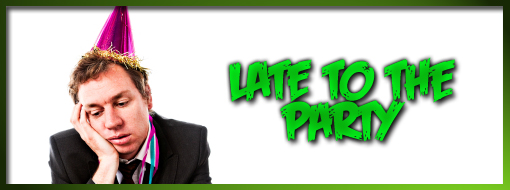So, because of the films I have (or haven’t, depending on your perspective) seen, when I think of film in the 60s I immediately think of what was happening in France with the New Wave and that’s what sort of dominates the decade for me. Which is kind of funny because America fucking exploded in the 60s. Civil Rights movements, women’s lib, anti-war movements, hippies, drugs, Woodstock, Andy Warhol, political assassinations – (counter)culturally we had a lot to talk about. And even though it’s hard to pin stateside cinema down to a singular movement like the French New Wave, there are a few movies here and there that definitely talked about it. This is one of them…sorta.
 Cool Hand Luke (1967) – Buy it from CHUD
Cool Hand Luke (1967) – Buy it from CHUD
Based on a book of the same name that was published in 1965, Cool Hand Luke is the story of, well, Luke; a handsome devil with no last name and no real sense of purpose. When we first meet him, Luke is drunk and absent-mindedly decapitating parking meters. His nonchalant demeanor and the way he just casually weaves in and out of and around the poles kind of suggests that he doesn’t really have anything better to do. “Oh you know how it is – small town, nothing much to do in the evenings.” It’s hinted that that’s how he lived his life prior and it’s certainly how he handles things in prison. It’s just a series of him doing everything common sense would tell him not to do. At first it seems noble when he refuses to lay down to fellow prisoner Dragline in a boxing match. But as the match goes on the nobility is peeled back and the whole thing becomes a sort of self-destructive farce on Luke’s part. And that’s kind of how his trajectory in the story goes – self-destruction in service of…well, having nothing better to do. That, of course, is what’s on the surface, but again, given the climate of the times, it’s not hard to boil Luke down to the film’s view of the anti-establishment/non-conformist movement. Question is, what exactly is it trying to say about it?
And honestly, I dunno – I sort of got the impression that the film was certainly interested in asking questions, but wasn’t too concerned with answering them. See, the film goes out of its way to sort of idealize Luke – romanticize him. He’s a helluva good guy (relatively)and you can tell there’s something in him that makes him do the things he does, and, to a degree whatever that something is is good. It’s the same thing that drove the kids in the 60s – that righteous “Fuck you, I won’t do what you tell me” attitude that, when all the dust settled, changed things for the better. And he’s infectious – having him around makes the other guys happy. They end up projecting so much of themselves onto him because he’s who they WANT to be. But as time goes by, much like with the boxing match, the film strips away his righteousness and shows him as nothing more than a lonely, self-destructive guy. It’s all pretty well encapsulated with the picture he sends the guys once he’s escaped the first time. There he is – living it up in a fine suit with two gorgeous ladies on his arm. The other prisoners eat it up. He’s doing what he wants, refusing to give in to the system and he’s living the good life. But, as it’s revealed later, it’s all fake – their ideals and their projections and all the hope they’ve pinned onto him are as false as the picture he paid for. And then once he comes back, they break him. For all his showmanship and his 50 eggs, even the great Luke succumbs to The Man. And it’s never kept a secret that if he had just done what they told him to in the first place none of this would have happened. After all, the warden and his guards weren’t bad guys – they indulged Luke and his friends in their frivolities and it’s Luke’s own stubborn self-destructiveness that led him to any pain that he endured. Hell, if he had made better choices he wouldn’t be in prison in the first place. And, at the end of it all, after the veneer has been shed completely and even Dragline knows that he’s bet it all on the wrong horse, Luke takes a bullet for his troubles. It seems like the message is clear: rage against the machine, kids, and the machine rages back. Yeah, sometimes nothing can be a real cool hand, but what’s all the money in the jailhouse worth if you end up dead?
However…
For all the trouble it goes to to paint Luke in this light, and for all the trouble it goes to to strip him of anything on which anyone can project an ideal it goes to just as much trouble to do the opposite. See, of everything that characterizes Luke, the most notable is that smile. And once he’s shot and he’s laying out dying in that backseat he flashes that smile once again. And if the film was firm in its convictions it would have found a way to make that smile ring as false as everything else about Luke. But it didn’t. And it rolled from that back out to the road, where Dragline was regaling the gang with the story – but in it Luke wasn’t self-destructive or lonely. He was THEIR Luke and when it cut from them to the fake picture, all put back together and that’s the last thing we see, the film seems to suddenly switch its message to a more allegorical “You can kill the man but you can’t kill an idea” thing, where Luke represents the SPIRIT of what was happening at the time and it very clearly lives on in the hearts of those men.
So, basically what I’m saying is – the film has no idea what the hell it’s trying to say. Now, I haven’t read the book and it may have a much firmer grasp on its own ideas (but considering Donn Pearce wrote the book and had a hand in the screenplay, I wouldn’t be quick to place my bet), but whatever the book may or may not have done thematically, the fact is that Stuart Rosenberg buckled underneath it. Now, that’s not to say it’s a bad film – that’s far from the case. Sure, Rosenberg’s direction was…spotty, to say the least, even at the basic level with clumsy edits and weird, nonsensical shots, but there’s no denying two things. One, the film is gorgeous. There’s something about rural Florida through Rosenerg’s lens that makes it feel natural to be constantly bathed in the “Golden Hour” tones and hues, and it’s beautiful. So beautiful, in fact, that it helps to confound the central point the film is trying to make – if you’re trying to cast your main character as an empty vessel upon which to project your futile ideals, then why did Rosenberg go to so much trouble to light and frame him as almost angelic? Even at the beginning, when the cops bust him for the parking meters, the way the officer’s flashlight shines off of Luke’s smile when the title treatment pops up is rather glorious.
Secondly, it’s Paul fucking Newman. For every criticism that can be lobbed against Rosenberg, the praise for Newman’s performance here would be ten-fold. I’m not schooled enough in Old Hollywood to start trying to contextualize it all amongst your Brandos and the like (even if it does make me think of Streetcar for some reason), but there’s something incredible about what Newman does here. The nuances he brings to Luke, the emotion, the lack of it – it all makes perfect sense in that character alone. When you read that Cool Hand Luke was selected for the National Film Registry for being “culturally, historically or aesthetically significant,” chances are it’s because of the work that Paul Newman turned in. And not only Newman – the entire cast is incredible, starting with George Kennedy as Dragline.
But, at the end of the day, beautiful photography and staggering performances aren’t all that make a great film. They certainly go a long way, yes, and they’re enough to make the film satisfying and even re-watchable on what is essentially a surface level, but that doesn’t change the fact that Cool Hand Luke is a movie that, to me anyway, either has no idea what it wants to say or no idea how to say it.
Failure to communicate, indeed.
